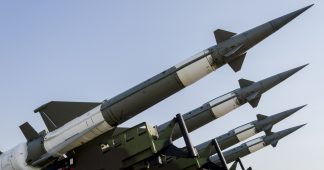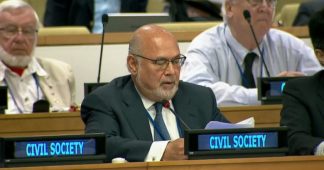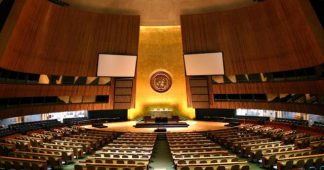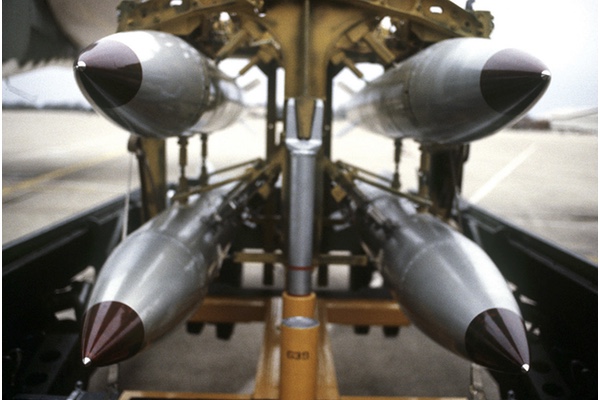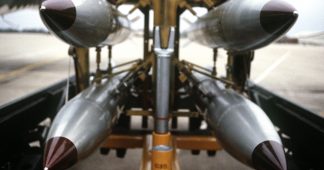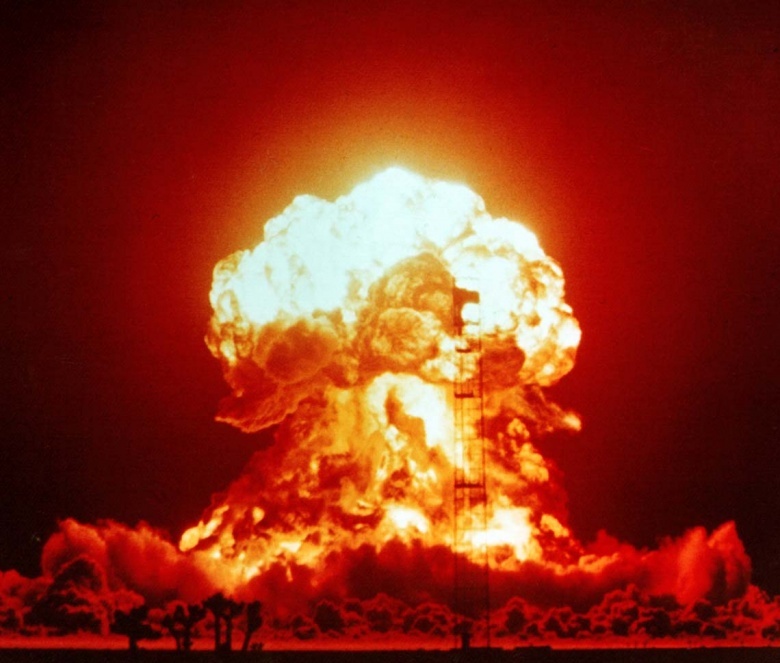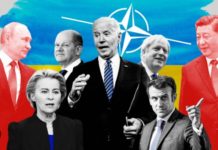ICAN isn’t the Nobel Peace Prize winner that policymakers wanted, but it’s the one they deserve.
By Jeffrey Lewis
October 9, 2017
The International Campaign to Abolish Nuclear Weapons (ICAN) has won the 2017 Nobel Peace Prize. The award was given to ICAN “for its work to draw attention to the catastrophic humanitarian consequences of any use of nuclear weapons and for its ground-breaking efforts to achieve a treaty-based prohibition of such weapons.”
I have nothing but sincere and heartfelt congratulations for ICAN — and not just because Beatrice Fihn, ICAN’s executive director, has been a guest on the Arms Control Wonk podcast. (Although it helps.)
My reaction, though, seems to be in the minority. The United States, of course, isn’t going to sign the Treaty on the Prohibition of Nuclear Weapons, which pretty much aims to do what its name says. And there are legitimate reasons to worry that the treaty, which ICAN was instrumental in developing, represents a desultory end to the world’s enthusiasm for nuclear disarmament, rather than some new dawn of a better age.
And yet for the all the reasons one might have for skepticism about ICAN’s win, I see something else in the sneering responses — something familiar, something ugly.
A few years ago, as the Barack Obama administration was desperately trying to choke to death the movement toward a nuclear weapons ban, I happened to attend a meeting in which I was one of only a tiny minority of disarmament supporters. A colleague, who I think might fairly be described as a cardinal in the one true church of nuclear deterrence — the faith that nuclear weapons offer the only guarantee of security — had been asked to brief the group on the movement to ban nuclear weapons. I was a little surprised when the cardinal started to speak. He delivered a talk that was centered, as I recall it, on how much he did not know about ICAN and how little he cared to learn about it. He presented a few sarcastic representations of the arguments as best he might distill them from a perusal of the organization’s website, clearly never deigning to actually sully himself by interviewing any of these apparent lunatics. Everyone laughed along with the cardinal in what felt, to me as an outsider, like some weird group encounter session. And it struck me at that moment: This is what a group of people look like when they are losing an argument and can’t understand why.
You don’t have to think that the nuclear ban treaty is a good idea to notice this self-defeating combination of insularity and condescension. I certainly don’t believe the treaty is a good idea, nor that the arguments mustered for the ban are terribly sophisticated. On more than one occasion, I’ve complained that ICAN only has one answer to sophisticated criticism: nuclear weapons are awful.
But let’s admit it: If you only get one argument, “nuclear weapons are awful” is a pretty damned good one. And if ICAN isn’t worth taking seriously, then why did the United States work so hard to kill its treaty? So maybe cynicism is the “smart” take on ICAN’s Nobel Prize when you are sitting in a nicely appointed conference room and worried about getting invited back. But out there, in the real world? ICAN is kicking your ass.
It didn’t have to be this way. The current wave of disarmament talk was kicked off in 2007 by George Shultz — Ronald Reagan’s secretary of state — still hurting after Reagan and Mikhail Gorbachev got this close in Reykjavik to an agreement to eliminate all U.S. and Soviet nuclear weapons. They blew it. And so, two decades later, Shultz and three other distinguished statesmen — Henry Kissinger, Sam Nunn, and Bill Perry — penned an unusual op-ed in the Wall Street Journal arguing that the United States should pursue a world free of nuclear weapons. They had intended to create a space for disarmament rhetoric — and boy did they do that.
Of course, each of the statesmen talked about the op-ed in slightly different ways. Shultz clearly felt that Reykjavik had been a missed opportunity. Nunn and Perry treated elimination as aspirational goal, the vision necessary to reorient nuclear policies that had gone astray. Kissinger acted like some intern had gone rogue with the autopen and signed his name to it.
But the space had been created. It was in this immediate period that old groups reinvented themselves to push anew for a world without nuclear weapons, giving us Global Zero and, most importantly, ICAN. And then there was the ambitious young senator from Illinois, trying to wrest the Democratic nomination for president away from Hillary Clinton.
During the campaign, Obama would give a speech in Chicago in which he embraced the idea of a world without nuclear weapons, as much to signal that he was different from Clinton as anything else. Once in office, of course, things became more complicated. Obama did give a speech in Prague in which he kept his campaign promise to state clearly that the United States seeks a world without nuclear weapons. He also secured a new strategic arms reduction agreement with Russia. But that was about it: one speech, one treaty.
Otherwise, on working toward a world without nuclear weapons, the Obama administration did very little. The President flatly rejected a time-bound commitment to disarmament, using the morbid standard that the elimination of nuclear weapons was unlikely to happen in his lifetime. I still recall a confused Pentagon bureaucrat plaintively asking what that standard might mean in very practical terms, like planning life-extension programs for various nuclear systems. I resisted the temptation to suggest we consult the actuarial table for a 48-year-old smoker.
In general, the Obama administration took the view that eliminating nuclear weapons was something to be worked out among the big boys — the so-called P5 states that are permanent members of the United Nations Security Council and, by happenstance, nuclear weapons possessors recognized by the Nuclear Nonproliferation Treaty — particularly the United States and Russia. As for nonnuclear weapons states eager for disarmament or ICAN? They received a courteous, if condescending, “Thank you for your interest in national security.” But the Obama White House’s disarmament strategy fell apart when the process of negotiating bilateral reductions with Russia stalled and both countries began far-reaching nuclear modernization programs. And then, of course, relations went in the toilet.
But neither ICAN, nor its allies among nonnuclear weapons states, were willing to wait. Read closely and you see that ICAN won the Nobel Prize not just for its role in the nuclear weapons convention, but also for its role in the series of meetings that were convened to discuss the humanitarian impact of nuclear weapons. There were three such meetings held — Oslo, Norway, in 2013, Nayarit, Mexico, in February 2014, and Vienna in December 2014 — which emerged from the anger and frustration in many countries at the failure to follow through on the promises made in Prague.
The United States and other P5 states refused at first to attend these meetings, hoping to deny any legitimacy to the growing movement to ban nuclear weapons. The United States also whipped votes against disarmament resolutions in the U.N. General Assembly. Over time, though, it became clear that the United States was losing the debate. When members of the P5 finally relented and agreed to attend the final conference in Vienna, it was too little, too late. They did so with the enthusiasm of someone having been invited to spend the holidays in Jonestown. By this time, it was clear that the countries were set on negotiating on a new nuclear weapons treaty on their own, outside the traditional consensus-based format of the Conference on Disarmament that hadn’t had a proper negotiation in more than 20 years.
The P5 again refused to participate in those negotiations, which took place in New York over the summer of 2017, while the United States placed extraordinary pressure on its allies not not to attend either. The result was that there were very few voices sympathetic to the concerns of the United States and its allies during its negotiation, as groups like ICAN took the lead. The final text was not as bad as it might have been — Washington can thank Sweden and few others for that — but it still falls short in some crucial ways. Most importantly in my view, it does not require signatories to be members in good standing of the Nuclear Nonproliferation Treaty, which I fear risks undermining the cornerstone of our efforts to prevent the further spread of nuclear weapons.
The treaty, flawed in this and other ways, stands little chance of winning the support of any nuclear weapons state, nor are many U.S. allies likely to sign it. In many ways, it is a symbolic agreement, one that exists to shame the nuclear powers more than to offer a pathway to a world without nuclear weapons. And because its represents a fundamental break in the coalition of people pushing for nuclear disarmament represented by the remarkable Wall Street Journal op-ed in 2007, I suspect it also represents the end of the current movement to ban nukes.
But the treaty represents a collapse in the disarmament movement not because civil society pushed too hard, but because the Obama administration failed to push back effectively. By refusing to engage in a constructive way, the Obama administration abandoned any chance of channeling the widespread enthusiasm for disarmament into a durable consensus on steps toward the elimination of nuclear weapons — what the administration used to call the Prague Agenda. The Obama administration made enemies of its friends and common cause with countries expanding their nuclear arsenals. And so it missed the opportunity to make good on the promises that lay behind hopes embedded in that other controversial Nobel Peace Prize — the one Obama got in 2009. Those hopes now belong to another era, one before the U.S. president issued nuclear threats day after day on Twitter.
In this way, these two Nobel Peace Prizes — 2009 and 2017 — are lovely, glittering bookends, holding up the volumes of Wall Street Journal op-eds, Adelphi books, conference proceedings and ultimately the slim little treaty that together record our era’s fleeting hopes for a different, more sane world.
Photo credit: Fabrice Coffrini/AFP/Getty Images
* Jeffrey Lewis is director of the East Asia Nonproliferation Program for the James Martin Center for Nonproliferation Studies at the Middlebury Institute of International Studies at Monterey.
